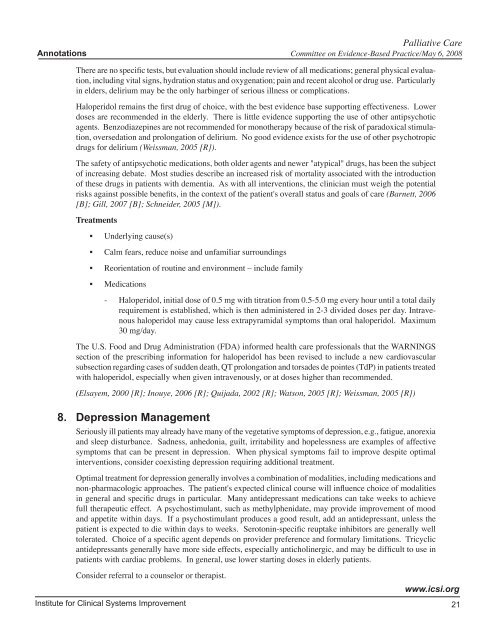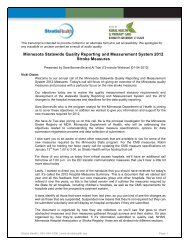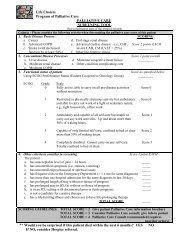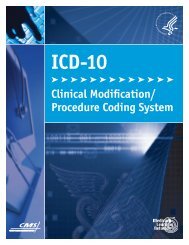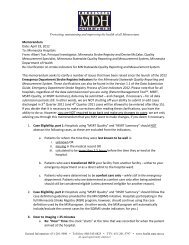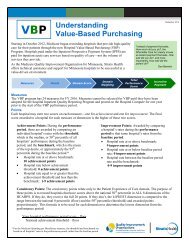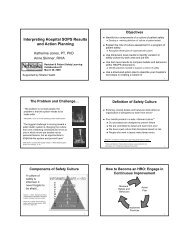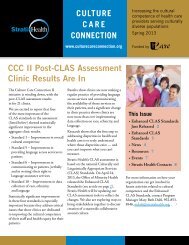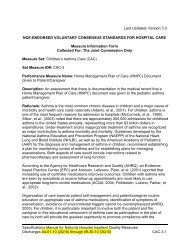Palliative Care Order Set - Stratis Health
Palliative Care Order Set - Stratis Health
Palliative Care Order Set - Stratis Health
You also want an ePaper? Increase the reach of your titles
YUMPU automatically turns print PDFs into web optimized ePapers that Google loves.
<strong>Palliative</strong> <strong>Care</strong><br />
Annotations Committee on Evidence-Based Practice/May 6, 2008<br />
There are no specific tests, but evaluation should include review of all medications; general physical evaluation,<br />
including vital signs, hydration status and oxygenation; pain and recent alcohol or drug use. Particularly<br />
in elders, delirium may be the only harbinger of serious illness or complications.<br />
Haloperidol remains the first drug of choice, with the best evidence base supporting effectiveness. Lower<br />
doses are recommended in the elderly. There is little evidence supporting the use of other antipsychotic<br />
agents. Benzodiazepines are not recommended for monotherapy because of the risk of paradoxical stimulation,<br />
oversedation and prolongation of delirium. No good evidence exists for the use of other psychotropic<br />
drugs for delirium (Weissman, 2005 [R]).<br />
The safety of antipsychotic medications, both older agents and newer "atypical" drugs, has been the subject<br />
of increasing debate. Most studies describe an increased risk of mortality associated with the introduction<br />
of these drugs in patients with dementia. As with all interventions, the clinician must weigh the potential<br />
risks against possible benefits, in the context of the patient's overall status and goals of care (Barnett, 2006<br />
[B]; Gill, 2007 [B]; Schneider, 2005 [M]).<br />
Treatments<br />
• Underlying cause(s)<br />
• Calm fears, reduce noise and unfamiliar surroundings<br />
• Reorientation of routine and environment – include family<br />
• Medications<br />
- Haloperidol, initial dose of 0.5 mg with titration from 0.5-5.0 mg every hour until a total daily<br />
requirement is established, which is then administered in 2-3 divided doses per day. Intravenous<br />
haloperidol may cause less extrapyramidal symptoms than oral haloperidol. Maximum<br />
30 mg/day.<br />
The U.S. Food and Drug Administration (FDA) informed health care professionals that the WARNINGS<br />
section of the prescribing information for haloperidol has been revised to include a new cardiovascular<br />
subsection regarding cases of sudden death, QT prolongation and torsades de pointes (TdP) in patients treated<br />
with haloperidol, especially when given intravenously, or at doses higher than recommended.<br />
(Elsayem, 2000 [R]; Inouye, 2006 [R]; Quijada, 2002 [R]; Watson, 2005 [R]; Weissman, 2005 [R])<br />
8. Depression Management<br />
Seriously ill patients may already have many of the vegetative symptoms of depression, e.g., fatigue, anorexia<br />
and sleep disturbance. Sadness, anhedonia, guilt, irritability and hopelessness are examples of affective<br />
symptoms that can be present in depression. When physical symptoms fail to improve despite optimal<br />
interventions, consider coexisting depression requiring additional treatment.<br />
Optimal treatment for depression generally involves a combination of modalities, including medications and<br />
non-pharmacologic approaches. The patient's expected clinical course will influence choice of modalities<br />
in general and specific drugs in particular. Many antidepressant medications can take weeks to achieve<br />
full therapeutic effect. A psychostimulant, such as methylphenidate, may provide improvement of mood<br />
and appetite within days. If a psychostimulant produces a good result, add an antidepressant, unless the<br />
patient is expected to die within days to weeks. Serotonin-specific reuptake inhibitors are generally well<br />
tolerated. Choice of a specific agent depends on provider preference and formulary limitations. Tricyclic<br />
antidepressants generally have more side effects, especially anticholinergic, and may be difficult to use in<br />
patients with cardiac problems. In general, use lower starting doses in elderly patients.<br />
Consider referral to a counselor or therapist.<br />
Institute for Clinical Systems Improvement<br />
www.icsi.org<br />
21


